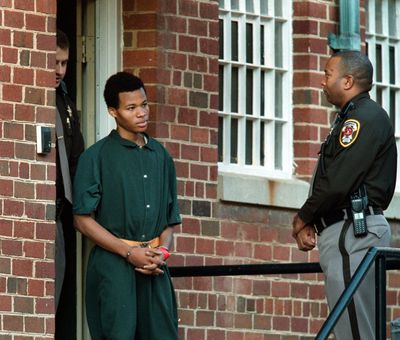D.C. sniper Lee Boyd Malvo denied parole in Va. after nearly 20 years

The Virginia Parole Board has denied convicted sniper Lee Boyd Malvo’s first application for parole, nearly 20 years after he and John Allen Muhammad shot and killed 10 people in the Washington area in October 2002.
Malvo, now 37, was given three life sentences without parole in 2004 for the three slayings committed in Virginia, when he was 17. But after the Supreme Court in 2012 restricted the imposition of life-without-parole sentences on juveniles, two federal courts ruled that Malvo must be resentenced. While Virginia appealed those rulings to the Supreme Court, its General Assembly passed a law in 2020 that created the possibility of parole for juvenile offenders serving sentences of 20 years to life. Virginia otherwise grants parole only to inmates who are at least 60 years old.
State records show that Malvo was considered for parole last month and was rejected on Aug. 30. “Considering your offense and your institutional records,” the parole board wrote, “the Board concludes that you should serve more of your sentence before being paroled.” The board cited the serious nature of Malvo’s crimes and said it considered him “a risk to the community.”
Malvo, who had lived in Bellingham, Washington, had just turned 17 when he accompanied Muhammad, who Malvo had met in Washington state, on a cross-country journey in which authorities allege they killed people in five states before arriving in the Washington, D.C. area, where they shot 16 people, 10 fatally, before being captured in Maryland in October 2002. Of the 10 people slain, three were in Virginia, which in 2002 still allowed the death penalty for juveniles. So Malvo and Muhammad were tried first, and separately, in Virginia.
Malvo was convicted at trial in 2003 of the Fairfax County slaying of Linda Franklin, and then pleaded guilty to two more slayings in Spotsylvania County. He received three life sentences. Virginia did not have parole at the time. Malvo later pleaded guilty to six more slayings in Maryland and received six more life sentences.
Muhammad was convicted at trial in 2003 of the Prince William County, Virginia, slaying of Dean Meyers and sentenced to death. He was executed in 2009.
The Supreme Court ruled in 2012 that juveniles may not be sentenced to life without parole unless a judge considers whether they are “the rare juvenile offender whose crime reflects … permanent incorrigibility.” Malvo had been granted a resentencing, but when Democratic Gov. Ralph Northam of Virginia in 2020 signed into law a bill creating the possibility of parole for juvenile offenders serving 20 years or more, Malvo agreed to drop his request for resentencing.
The Supreme Court adjusted its criteria for juvenile life-without-parole sentencings in 2021, saying “permanent incorrigibility” need not be the standard for a judge who is deciding whether such a sentence is appropriate. But last month, the Maryland Court of Appeals, the state’s highest court, said Malvo was still entitled to a resentencing hearing. Now, a court must determine whether a juvenile’s crime “was the result of transient immaturity, as opposed to permanent incorrigibility,” in deciding whether life without parole is appropriate, the Court of Appeals wrote.
Malvo’s criminal attorney in Virginia, Craig Cooley, said he was aware that the Virginia Parole Board was planning to consider Malvo’s case, but he did not represent Malvo there and had not been informed of the result.
The Virginia parole records indicate the parole board considered more than 100 inmates who were sentenced to more than 20 years in prison as juveniles last month. All were denied parole.